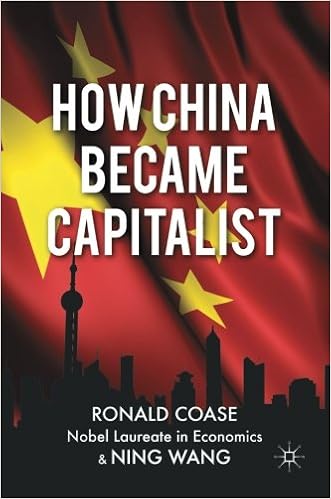
Free How China Became Capitalist Ebooks To Download

This book examines the extraordinary events that led to China's transformation from a closed agrarian economy to an invincible manufacturing powerhouse of the global economy.

Paperback: 256 pages
Publisher: Palgrave Macmillan; 2012 edition (April 8, 2013)
Language: English
ISBN-10: 1137351438
ISBN-13: 978-1137351432
Product Dimensions: 6.2 x 0.4 x 11.1 inches
Shipping Weight: 14.9 ounces (View shipping rates and policies)
Average Customer Review: 4.0 out of 5 stars See all reviews (21 customer reviews)
Best Sellers Rank: #405,136 in Books (See Top 100 in Books) #81 in Books > Business & Money > Economics > Urban & Regional #153 in Books > Textbooks > Business & Finance > Economics > Economic Theory #255 in Books > Business & Money > Economics > Free Enterprise

Few scholars have changed the face of economics like Ronald Coase. His work brought a very rare commodity to the economics profession - clarity. His observations, based on empirical evidence and "old-fashioned" fact-finding, have unearthed a body of work that has transformed the way we think about simple, but crucial, facts. The ways individuals and firms organize and his work on property rights had a profound impact on how we comprehend issues from the inner working of organizations to the use of market tools to address environmental problems. On the latter, his work provide the academic underpinning for the establishment of the Acid Rain program in the United States in the early 1990s, which was so successful that it virtually wiped out the problem of acid rain in America.At a 101 and not a man to avoid challenges, he now braces himself on an issue that many in the West are puzzled by -"How China Became Capitalist". Again, he brings clarity to a confused picture. Without embracing dogmas from either left or right, he traces the history of Chinese reforms from the rise of Deng Xiaoping to the present. In Coase and co-author Ning Wang's recounting and interpretation, we learn about the unleashing of China's experiment with capitalism. Rather than a top-down approach as many believe, the Chinese government fostered competition between cities and provinces; allowed for experiments and pilots to take place in certain sectors, industries and regions. China after Mao had a blank slate from which to experiment. Throughout this, Coase's work on property rights was critical to many Chinese policy makers. It is no coincidence that alongside Marx and Friedman, Coase is one of the most revered Western economists in China.Coase is the finest of scholars.
Everyone knows Ronald Coase is a great economist, but "How China Became Capitalist" shows us that he is a great historian too. In his new book, Coase approaches history in the same manner he approaches economics. As an economist, Coase has always guarded against the tendency for grand, scintillating theories to overtake quantifiable facts. In writing about what is arguably one of the most turbulent periods in Chinese history, he again seems to relinquish all presumption by piecing together observable historical evidence and letting the conclusions emerge by themselves. The results were surprising but not altogether unintuitive.Many regard China's transformation from a communist economy to a capitalist one as one of the greatest paradoxes in the 20th century. The authors, however, are able to provide a persuasive account of how this came to be. The general theory is that the capitalist transformation in China is the product of marginal, or fringe, revolutions that occurred independently of the machinations of the Chinese government. This is not to say that the Chinese government did not play a role in fostering these developments. As illustrated by the authors, in many cases the Chinese government fostered the environment conducive to the flourishing of capitalism without intending to. The emergence of private farming in the 1960s is a good example. Private farming was encouraged by the Chinese government as a temporary measure to quell grain shortages after the failure of the Great Leap Forward became apparent. Such an ad hoc measure however, had lasting, albeit unintended, implications for China's economic development.The argument is more nuanced than this.
How China Became Capitalist How Everything Became War and the Military Became Everything: Tales from the Pentagon How I Became A Ghost - A Choctaw Trail of Tears Story (Book 1 in the How I Became A Ghost Series) The Devil Soldier: The American Soldier of Fortune Who Became a God in China The Mushroom at the End of the World: On the Possibility of Life in Capitalist Ruins The New Capitalist Manifesto: Building a Disruptively Better Business The Ambitious Capitalist's Guide to Investing in GOLD: How to Invest in GOLD without Getting Your Fingers Burned! (Precious Metals) (Volume 1) Buffett: The Making of an American Capitalist Pequeño cerdo capitalista: Finanzas personales para hippies, yuppies y bohemios [Small Capitalist Pig: Personal Finance for Hippies, Yuppies and Bohemians] The Labour Debate: An Investigation into the Theory and Reality of Capitalist Work Post-Capitalist Society Venture Deals: Be Smarter Than Your Lawyer and Venture Capitalist Stitched Up: The Anti-Capitalist Book of Fashion (Counterfire) Adventure Capitalist: The Ultimate Road Trip Poorly Made in China: An Insider's Account of the Tactics Behind China's Production Game 2010 Special Report: China Life & Non-Life - Market Review. China: A Dangerous Wind or An Opportunity? A.M. Best's Perspective Poorly Made in China: An Insider's Account of the China Production Game Introduction to Sourcing, Importing & Private Label Branding Products From China For .com Sellers: Building a branded product foundation for your ... to Sourcing From China Book 1) The Import Bible Part 3: Take your importing business to the next level, go to China! Business in China The Great Wall of China: The History of China's Most Famous Landmark



